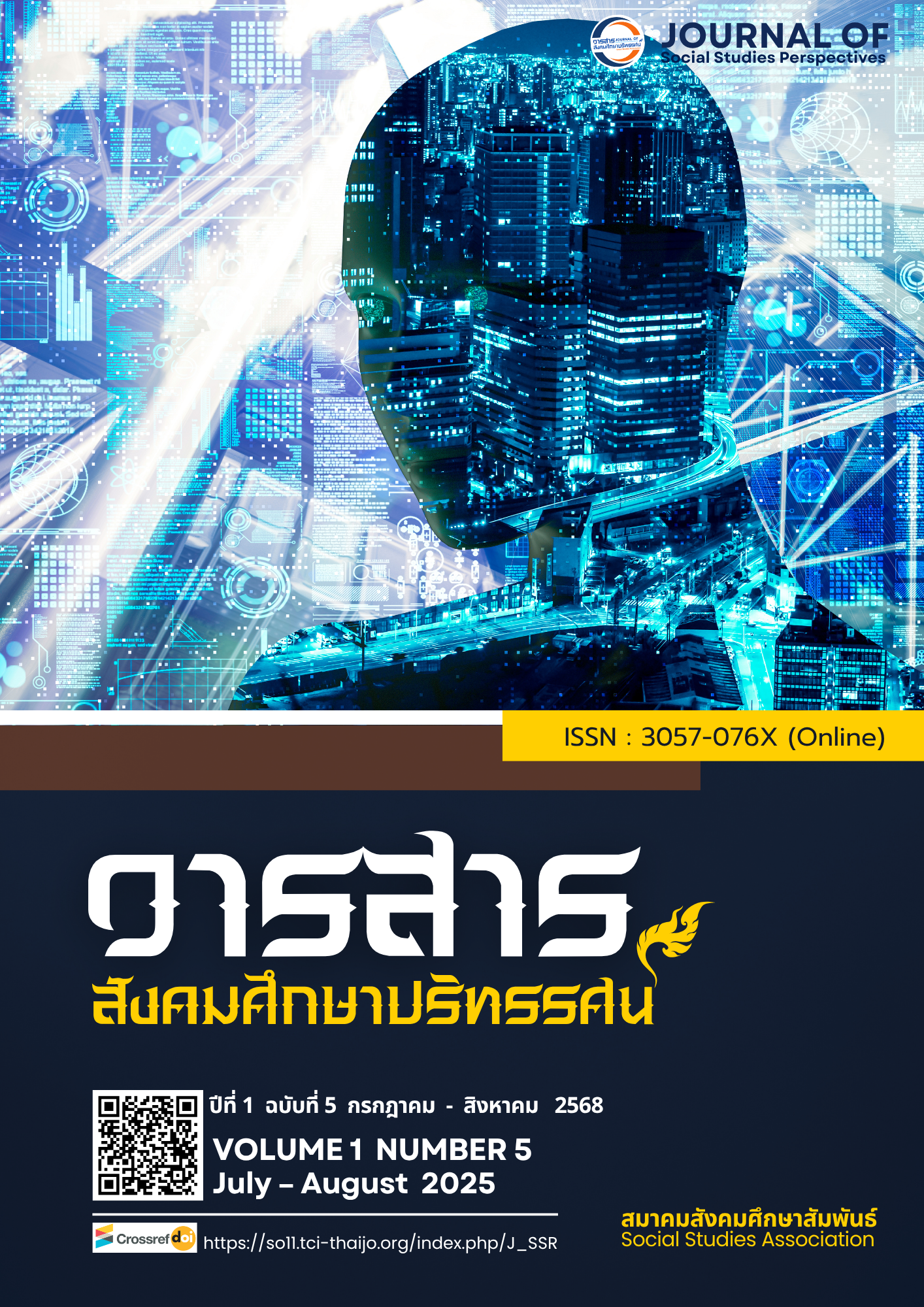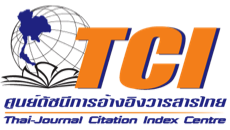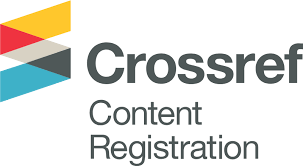การพัฒนาผลสัมฤทธิ์ทางการเรียนและความสามารถในการคิดวิเคราะห์ ด้วยการจัดการเรียนรู้แบบร่วมมือโดยใช้เทคนิคกลุ่มแข่งขัน เรื่อง เศรษฐศาสตร์กับการดำเนินชีวิต สำหรับนักเรียนชั้นมัธยมศึกษาปีที่ 2
DOI:
https://doi.org/10.64186/jsp2248%20%20%20คำสำคัญ:
ผลสัมฤทธิ์ทางการเรียน , ความสามารถในการคิดวิเคราะห์ , การจัดการเรียนรู้แบบร่วมมือ , เทคนิคกลุ่มแข่งขัน (Teams-Games-Tournament)บทคัดย่อ
บทความวิจัยนี้มีวัตถุประสงค์เพื่อ 1) พัฒนาและหาประสิทธิภาพของแผนการจัดการเรียนรู้แบบร่วมมือโดยใช้เทคนิคกลุ่มแข่งขัน (TGT) เรื่อง เศรษฐศาสตร์กับการดำเนินชีวิต วิชาสังคมศึกษา สำหรับนักเรียนชั้นมัธยมศึกษาปีที่ 2 ให้เป็นไปตามเกณฑ์ 80/80 2) เปรียบเทียบผลสัมฤทธิ์ทางการเรียนก่อนและหลังการใช้เทคนิค TGT และ 3) ศึกษาความสามารถในการคิดวิเคราะห์ของนักเรียนหลังได้รับการจัดการเรียนรู้ด้วยเทคนิค TGT การวิจัยนี้เป็นการวิจัยเชิงปริมาณ มีกลุ่มเป้าหมายคือนักเรียนชั้นมัธยมศึกษาปีที่ 2 โรงเรียนบ้านนาโก ปีการศึกษา 2567 จำนวน 17 คน ซึ่งคัดเลือกแบบเจาะจง เครื่องมือที่ใช้ในการวิจัยประกอบด้วย 1) แผนการจัดการเรียนรู้ 10 แผน 2) แบบทดสอบวัดผลสัมฤทธิ์ทางการเรียน 30 ข้อ และ 3) แบบประเมินความสามารถในการคิดวิเคราะห์ 20 ข้อ วิเคราะห์ข้อมูลโดยใช้สถิติเชิงพรรณนา ได้แก่ ค่าร้อยละ ค่าเฉลี่ย และส่วนเบี่ยงเบนมาตรฐาน ผลการวิจัยพบว่า 1) แผนการจัดการเรียนรู้ที่พัฒนาขึ้นมีประสิทธิภาพเท่ากับ 90.41/83.92 ซึ่งสูงกว่าเกณฑ์ที่กำหนด 2) ผลสัมฤทธิ์ทางการเรียนของนักเรียนหลังเรียนสูงกว่าก่อนเรียนอย่างมีนัยสำคัญทางสถิติ และ 3) นักเรียนมีความสามารถในการคิดวิเคราะห์โดยรวมอยู่ในระดับดีมาก โดยมีคะแนนเฉลี่ย 17.29 จาก 20 คะแนน คิดเป็นร้อยละ 86.47 องค์ความรู้ที่ได้จากงานวิจัยนี้ชี้ให้เห็นว่าเทคนิค TGT เป็นแนวทางที่มีประสิทธิภาพในการพัฒนาทั้งความรู้ความเข้าใจในเนื้อหาเศรษฐศาสตร์ และส่งเสริมทักษะการคิดวิเคราะห์และการทำงานร่วมกัน ซึ่งเป็นทักษะที่จำเป็นสำหรับผู้เรียนในศตวรรษที่ 21
เอกสารอ้างอิง
Bloom, B. S. (Ed.). (1956). Taxonomy of educational objectives: The classification of
educational goals. Handbook I: Cognitive domain. David McKay.
Butar-Butar, R., Pohan, R., & Sirait, M. (2022). The effectiveness of TGT (Teams-Games-
Tournament) cooperative learning model in improving students’ economic learning
outcomes and critical thinking. In Proceedings of the 2nd Annual Conference on
Education and Social Science Research (ACESS 2022) (pp. 128–134). EAI. https://doi.org/10.4108/eai.14-9-2022.2324976
Homsombat, P., & Saengsai, P. (2021). Learning management on social studies in the 21st
century. Journal of MCU Ubon Review, 6(3), 825–840. (in Thai)
Lohajoti, S. (2022). Factors influencing educational achievement of small schools in special
areas: Multilevel model [Master’s thesis, Thammasat University]. Thammasat University Digital Collections. http://digital.library.tu.ac.th/tu_dc/frontend/detail/tcdc/198751
Matitaputty, J. K., Susanto, N., Fadli, M. R., & Ramadhan, I. (2023). The effect of Team Games
Tournament (TGT) in social science learning to improve student learning outcomes. Al
Ibtida: Jurnal Pendidikan Guru MI, 10(2), 409–420. http://dx.doi.org/10.24235/al.ibtida.snj.v10i2.15847
Nofriansyah, N., Wardiman, J., & Rahmi, Y. (2024). The effect of the Team Games Tournament
(TGT) learning model on students’ achievement in economics education. Journal of
Economics and Economic Education, 1(2), 144–155. https://doi.org/10.37715/jeee.v1i2.296
Office of the Basic Education Commission. (2010). Naew patibat kan wat lae pramoenphon
kan rianru tam laksut kaen klang kansuksa khan phuenthan Phutthasakkarat 2551
[Guidelines for measurement and evaluation of learning according to the Basic Education Core Curriculum B.E. 2551]. Agricultural Cooperative Federation of Thailand Printing Press.
Phumyaem, N., & Pooncharoen, K. (2022). Effective active learning management of
economics for visually impaired students in Chiangmai. Journal of Buddhist Education and Research, 8(3), 46–63. (in Thai)
Rinrit, S., & Charbudboontarik, S. (2020). Learning and teaching management of social studies
in 21st century. Journal of Roi Kaensarn Academi, 5(2), 204–212. (in Thai)
Sakorn, W., Srikram, J., Sarnkong, R., & Khamhong, N. (2025). Multimedia computer-based
lessons on programming with Scratch in technology integrated with the TGT
cooperative learning technique to enhance learning achievement and teamwork ability of Thai Grade 7 students. Higher Education Studies, 15(2), 1–15. https://doi.org/10.5539/hes.v15n2p1
Slavin, R. E. (1980). Cooperative learning. Review of Educational Research, 50(2), 315–342.
https://doi.org/10.3102/00346543050002315
Slavin, R. E. (1996). Research on cooperative learning and achievement: What we know, what
we need to know. Contemporary Educational Psychology, 21(1), 43–69. https://doi.org/10.1006/ceps.1996.0004
Sung-ngam, D. (2019). The development of lesson plan through TGT cooperative learning
activity topic: Thai cultures and countries in Asian region cultures of Mathayomsuksa
students. Kosumwitthayasan School. (in Thai)
Van Wyk, M. M. (2011). The effects of the Teams-Games-Tournaments (TGT) cooperative
learning strategy on economics education learners’ performance in grade 10
classrooms. International Journal of Educational Sciences, 3(1), 79–86. https://doi.org/10.1080/09751122.2011.11890011
Yenjai, P., Nongharnpituk, P., & Khansila, P. (2025). Developing mathematical problem-solving
ability in fractions among Grade 5 students through cooperative learning using TGT
technique and bar model. Journal of Science and Science Education (JSSE), 8(1).
(in Thai)
ดาวน์โหลด
เผยแพร่แล้ว
รูปแบบการอ้างอิง
ฉบับ
ประเภทบทความ
หมวดหมู่
สัญญาอนุญาต
ลิขสิทธิ์ (c) 2025 วารสารสังคมศึกษาปริทรรศน์

อนุญาตภายใต้เงื่อนไข Creative Commons Attribution-NonCommercial-NoDerivatives 4.0 International License.
บทความนี้ได้รับการเผยแพร่ภายใต้สัญญาอนุญาต Creative Commons Attribution-NonCommercial-NoDerivatives 4.0 International (CC BY-NC-ND 4.0) ซึ่งอนุญาตให้ผู้อื่นสามารถแชร์บทความได้โดยให้เครดิตผู้เขียนและห้ามนำไปใช้เพื่อการค้าหรือดัดแปลง หากต้องการใช้งานซ้ำในลักษณะอื่น ๆ หรือการเผยแพร่ซ้ำ จำเป็นต้องได้รับอนุญาตจากวารสาร










